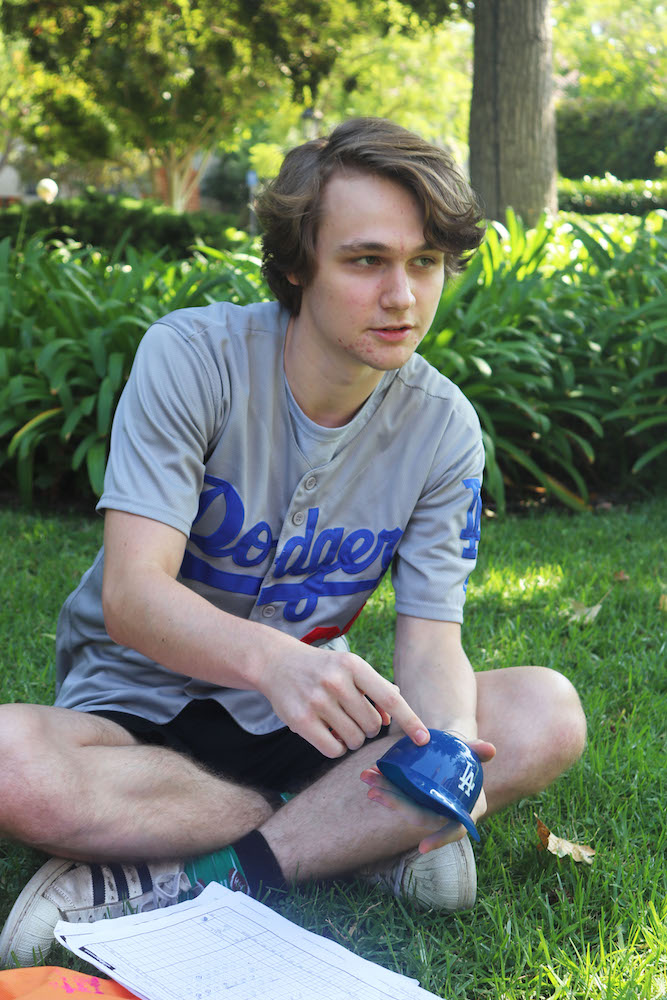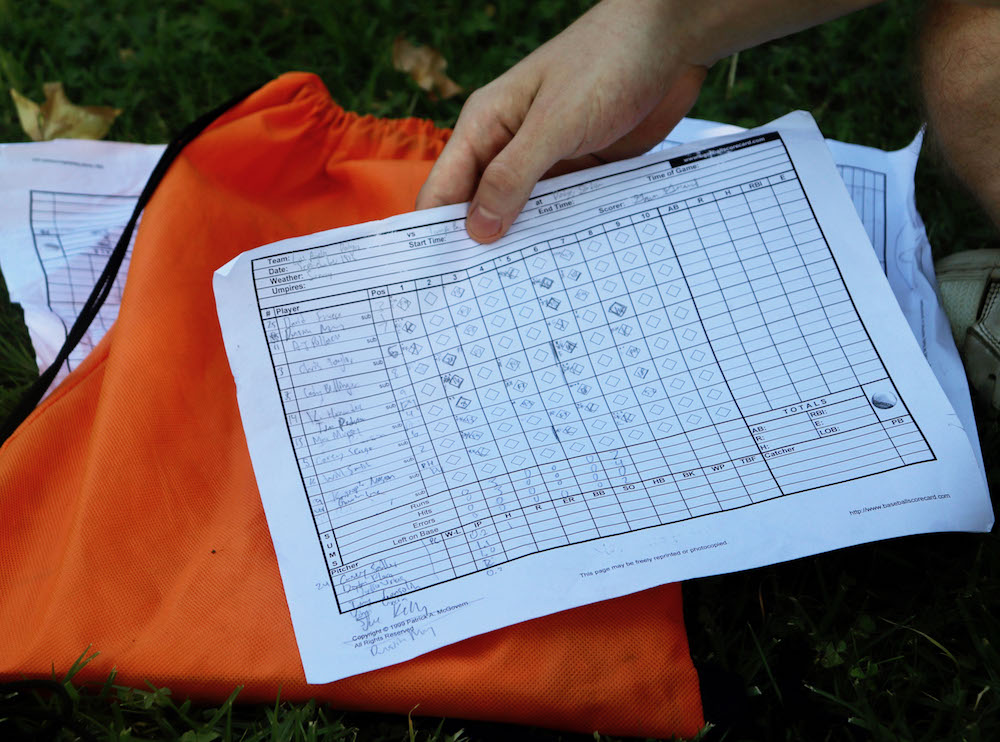
For an everyday sports fan, catching that week’s game on TV or texting a friend about an especially bitter loss might be the beginning and end of their excitement. But for superfans, love for a sport might show in slightly different ways: creating a computer program predicting match outcomes, mapping a favorite team’s ranking against a relationship status timeline, organizing superfan groups who never miss a team’s game. No matter how their love materializes — whether they are professors who teach sports in the classroom, athletes themselves or self-proclaimed sideliners — avid sports fans across Occidental’s campus share a love for their game that runs deeper than the average spectator.
Over the past six years, Politics professor Jennifer Piscopo has taught the Cultural Studies Program (CSP) course “Politics, Culture, and Sports.” Students analyze the intersection of sports, both amateur and professional, with topics ranging from racial justice to international relations. Outside of the classroom, Piscopo said baseball is her favorite sport, but she will watch almost any live sporting event. For her, baseball’s accessibility is what makes it unique.
“You can go to a baseball game without spending a lot of money,” Piscopo said. “It might still be out of reach for many people, but you can get a ticket to the Dodgers for $18, $20. Compare that to an NFL game, where the cheapest seats could be $200.”
Though originally from Massachusetts, Piscopo said the Los Angeles Dodgers have captured her loyalty. One of her favorite baseball memories was going to Game 7 of the 2017 World Series with the Dodgers hosting the Houston Astros. While the Dodgers’ loss that night made the playoff game bittersweet, Piscopo remembers an energy in the stadium different from regular games, one difficult to describe in words. Beyond the excitement, Piscopo said what draws her to any sport is getting a glimpse of athletes’ single-minded dedication.
“I think that tells us something about grit and determination,” Piscopo said. “I think there is a component of talent, but I think there is also a component of hard work, and we don’t see that hard work when we just watch them perform at their event. We don’t see the other 18 hours they spend a day thinking about their sport.”
Professor Stephen Klemm of the Comparative Studies in Literature & Culture department also admires the discipline required of athletes performing under pressure. He describes himself as an avid, almost obsessive sports consumer who loves all major American sports and teams based in Chicago. Sports have created shared memories with his family: frequenting games with his dad and grandpa at Comiskey Park, texting with his brother to commiserate about the White Sox’s losses. One memory of his grandfather stands out.
“My grandpa — when he was alive, he died when I was 10 — he would sit on the far right end of the couch and he would have a radio playing the Bulls preseason game, he’d have the White Sox on the small TV to his right, and he’d have the Bears right there,” Klemm said, gesturing in front of him. “I remember getting a Sega Genesis system when I was 9 and trying to plug it in. And my grandpa, he was snoring, apparently sleeping. He’d snore very deeply. The minute I tried changing the television and tried to set up my game system, he immediately woke up and would smack me with his cane and say, ‘Nope.’ And he’d name the quarter and the time of the Bears game.”
After catching Klemm, his grandfather would go straight back to sleep.

Logan McIntyre (senior) also found a love for his favorite sport, mixed martial arts (MMA), through his grandfather, who first mentioned the sport to a young McIntyre taking karate lessons. Unlike typical team sports, McIntyre said MMA’s high fighter turnover means he roots for different fighters every weekend. To keep things interesting, McIntyre compares his favorite fighters in a given weekend against an algorithm he developed in his computer science course, “Machine Learning,” that conducts statistical analyses of the fighters’ records and attempts to predict the winner of a match. McIntyre said rather than swaying his loyalty for a given fighter, the algorithm gives him early hope — or disappointment — at his favorite fighter’s prospects.
“Often, I’ll just really be hoping that [the algorithm] supports what I know is probably not going to be the case. I’m like, ‘I really hope this guy wins! I know he’s probably not!’ And then it tells me, ‘He’s probably not.’ And then I go, ‘Ah, damn.’”
Fighter turnover combined with unexpected, dramatic last-minute knockouts creates the unpredictability that McIntyre loves most about MMA. One of McIntyre’s most memorable fights featured Stephen Thompson. A fan favorite, Thompson had been training for a year and was up against an opponent fans assumed he would easily beat, McIntyre said. Less than 8 seconds before the final bell rang ensuring his victory, Thompson’s opponent knocked him out.
“I just sat there, and it was a moment where I was almost like, ‘I don’t know if I can watch this sport again,’” McIntyre said. “Ultimately, it’s just another reminder that you can work really hard and do everything right and sometimes, it doesn’t work out.”
While an MMA fighter’s moment of failure may come unpredictably, Gavin Griswold (first year) loves that baseball is grounded in predictable failure. Griswold explained that even the best players, such as the Dodgers’ Cody Bellinger, might have a batting average of .305.
“Seven times out of 10, he’s not doing what he succeeds at,” Griswold said. “But in that game, you kind of have this expectation that the team won’t do as well as they should. And so it can lead to surprises.”
Sometimes, those surprises come in the form of statistical anomalies, Griswold said. Besides its predictable failure, he loves the numbers-driven, analytical side of baseball. For him, stories about a player emerge in the data. Griswold named the Oakland Athletics’ Khris Davis, who batted .247 for four consecutive seasons, as a favorite example of this. Davis’ bizarre record led to an unusual stadium sight: fans rooting for a player’s failure.
“Those moments leading up to his at-bats on the final games would be really interesting because you’d want him to do a specific number,” Griswold said. “Usually, as a fan, you want them to hit every time, but then in those specific moments you want him to hit one hit and then strike out the next few times.”
Griswold keeps a collection of scorecards he filled out, by hand, during each game he has attended in person. He learned how to fill out scorecards in high school, when he was the baseball team manager. As players take the field, Griswold pencils in their performance: letter-number abbreviations track hits and outs, miniature diagrams indicate a ball’s trajectory.

Griswold’s fondness for baseball data analysis does not mean he shuns typical sports superstitions, such as not washing a beloved jersey. Sometimes the two — statistics and superstition — converge.
“This is really a weird one. But we did the analytics, me and my friends, and when I am in a relationship, the Oakland A’s are, like, 17th out of 30th in the league. When I’m not in a relationship, they’re the third-best team in the league,” Griswold said. “That’s kind of the best superstition that I have. Basically, I have to be single and miserable to have the Oakland A’s do well.”
JT Tinsley (senior), a linebacker on Occidental’s football team, said his love for sports came from his childhood growing up in the South — first in Opelika, Alabama, then Atlanta, Georgia. His favorite sport is football, and his favorite teams are Alabama, the Dallas Cowboys and Occidental. His love for his brothers on the field, Tinsley said, is what motivates him to wake up at 6 a.m. for sweat-drenched practices.
Wanting to share that feeling of support led Tinsley to create Oxy Six Men with Tyler Webb (senior), a friend and accomplished sprinter for Occidental’s track and field team. Oxy Six Men is a group of student fans who coordinate together to fill stands and cheer on classmates. Tinsley said he and Webb started Oxy Six Men in their first year and began by attending women’s basketball games to support their friends on the team. That year, Tinsley said, they did not miss a single women’s basketball game.
As a fan, Tinsley said he enjoys watching someone he knows from a class take to the field or court and excel at a sport entirely different from his own.
“When you see one of your homies playing a sport, it’s like, ‘Wow,’” Tinsley said, “Because I guess everybody’s like, ‘I could never do that.’ Like, when I see water polo, I’m like, ‘I could never do that.’ I can’t even swim, you know? Like, I could never do that. So when people come and they get to see me, it feels good.”
As an athlete, Tinsley understands how meaningful it can be to look across the field and see people there to support you. He said memories of classmates packed into the stands, screaming and cheering you on, stay with you until the day you die.
“Sports is a part of the culture here. And a lot of the athletes here, they’re emotionally underrepresented. They feel like nobody cares about it. Which is why if I’m at anybody’s game, I’m going to cheer, whether it be women’s lacrosse, whether it be baseball, soccer — I don’t know anything about soccer, but I’m going to cheer, you know?” Tinsley said. “We work just as hard, if not harder, than athletes that are playing at bigger schools around the area.”
Tinsley said above all, he recognizes how life-changing sports can be for himself and other black men on campus.
“There’s only like, 62, maybe, on campus. But of us, a lot of us play sports. And I find that always interesting,” Tinsley said. “For a lot of us, it’s bigger than the game. Because this game — or whatever we play, whether we quit when we got here or not — it allowed us to get to a school that’s going to be able to really change the course of our family’s lives. And to me, that’s what’s powerful.”
![]()






























